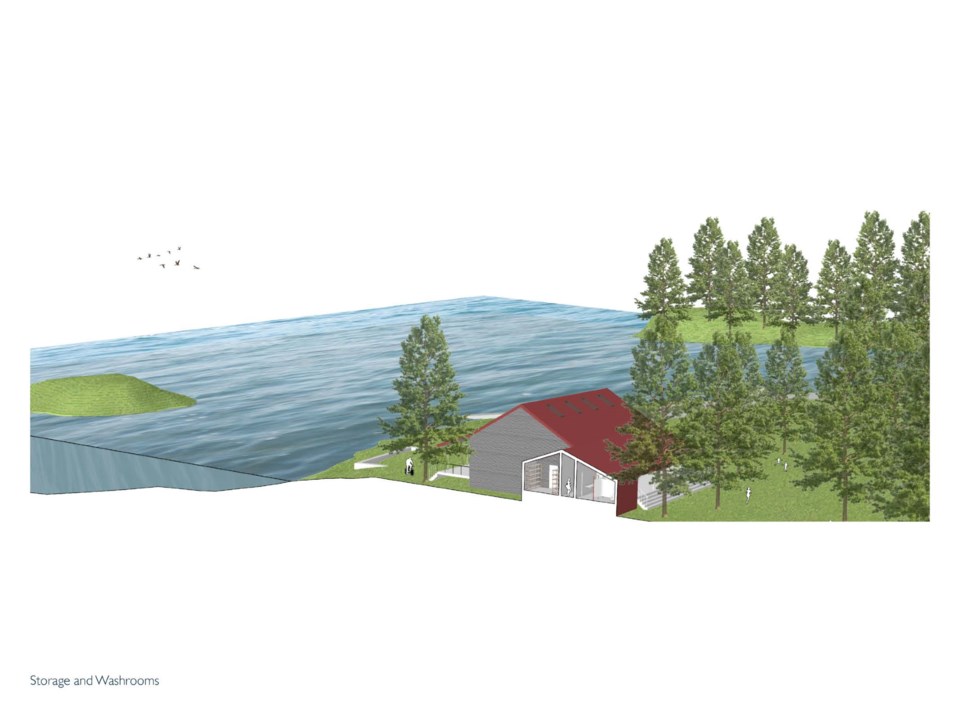The price tag, timeline and potential rural area tax impacts for the proposed Coopers Green hall replacement keep going up.
A report on the Sunshine Coast Regional District’s (SCRD) Oct. 13 board meeting (held after Coast Reporter deadline) agenda was labelled a “construction update," but no construction has started. The report asked elected officials to authorize adjustments including geohazard mitigation strategies on plans to build the new structure near the existing hall site, explore building on a different Halfmoon Bay location, or to do both before making a siting decision. That work would take between seven and 11 months with costs estimated in the range of $50,000 to $135,000.
The report stated those funds would need to be raised through 2023 taxation on all rural areas, so that public consultation on project adjustments could be hosted next year. Once a location is finalized, staff estimates tendering construction in mid-2024 with a goal of having hall doors open in late 2026. It states that timeline was developed “assuming the project does not encounter challenges such as archeological findings, supply chain delays, etc.”
Staff’s report on rethinking location or design of the $4.5 million project followed a review of a geotechnical report from 2017. That was completed this summer. It noted with risks related to climate change and sea level rise at the current hall site, any new structure’s base elevation should be increased to 5.3 metres and be setback a minimum of 7.5 metres from the ocean. To rebuild on lower Coopers Green the SCRD’s architectural consultant indicated such adjustments would require significant design changes and that building costs “would be escalated drastically." In light of that detail, staff presented recommendations related to the feasibility of building on the current site along with options in other locations.
Community Association says put off consultation
In a submission dated Oct. 11, the Halfmoon Bay Community Association (HBCA) urged the board save time and money, by undertaking technical investigations on the existing Coopers Green option without further community consultation. “We do not believe the cost and time for community engagement is required now. Furthermore, the community at large is not qualified to comment on the technical outcome of the expert review,” its letter stated.
The HBCA also wants public consultation on alternative sites streamlined by limiting alternative sites to Coopers Green’s upper parking lot or Connor Park. It viewed an SCRD proposed option in Lohn Road park as a “non-starter."
“The alternate location at upper Coopers Green park is the only alternative that can rely on continued support by the Halfmoon Bay community," it said, also pointing out that most of the $400,000 in project donations “likely would not be available if the hall was proposed to be built at a site other than Coopers Green park."
Another measure the HBCA recommended was immediate convening of “a council of interested parties” to review of the two supported site alternatives rather than a full public engagement process. It offered to do this work with the SCRD and said that its “primary objective is the continuing improvement of community assets for the benefit of the community.”
The association’s letter also stated that “in the unfortunate but possible event that there is no feasible or affordable solution for a hall at Coopers Green,” it wants to see improvements, such as a covered performance and/or picnic space and improved washrooms built at that park.
Grant timeline extension requested
The project’s timing is another concern. With no finalized design in place and debate on its location continuing, completing the structure by the March 2025 deadline to qualify for its $2 million Canada Infrastructure Program grant appears unlikely. According to the staff report, a formal request for an extension to the completion date has been submitted and “a one-year extension is very likely.”
Replacement of the more than 100-year-old Coopers Green hall structure was recommended in 2016 and approved in 2021. By mid-2022, the new hall’s budget ballooned from $3 to $4.5 million. In July 2022, the board approved securing a short-term loan of almost $1 million to meet rising project costs and that if further grant funding is obtained, that it be used to pay down that borrowing.



